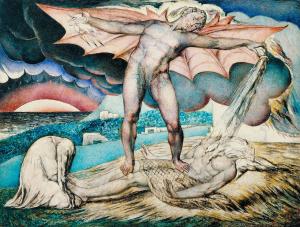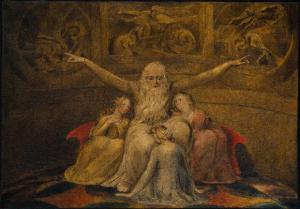 Today’s lection is chock full of very familiar biblical lines: “Ho, everyone who thirsts, come to the waters, and you that have no money, come, buy and eat!” “Seek YHWH while God may be found, call upon YHWH while near; let the wicked forsake their way, and the unrighteous their thoughts; let them return to YHWH, that YHWH may have mercy on them, to our God, for God will abundantly pardon.” The author of II- Isaiah surely had a way with the memorable phrase! Over 2500 years after his magnificent poetry we are still repeating his glowing words. In fact, it is I think fair to say that the language of this 16-chapter Babylonian exilic book has become for Christians the most significant collection in the Hebrew Bible. We turn to it at Christmas (“Comfort, comfort, my people”) and at Easter (“he was bruised for our iniquities”), and at numerous days during the entire year. It may not be too much of an exaggeration to claim that Is.40- 55 provides more of a foundation for Christian theology than any other book of the First Testament.
Today’s lection is chock full of very familiar biblical lines: “Ho, everyone who thirsts, come to the waters, and you that have no money, come, buy and eat!” “Seek YHWH while God may be found, call upon YHWH while near; let the wicked forsake their way, and the unrighteous their thoughts; let them return to YHWH, that YHWH may have mercy on them, to our God, for God will abundantly pardon.” The author of II- Isaiah surely had a way with the memorable phrase! Over 2500 years after his magnificent poetry we are still repeating his glowing words. In fact, it is I think fair to say that the language of this 16-chapter Babylonian exilic book has become for Christians the most significant collection in the Hebrew Bible. We turn to it at Christmas (“Comfort, comfort, my people”) and at Easter (“he was bruised for our iniquities”), and at numerous days during the entire year. It may not be too much of an exaggeration to claim that Is.40- 55 provides more of a foundation for Christian theology than any other book of the First Testament.
And that fact, for me, is not always a good thing, for I find the theology of II- Isaiah to be problematic if not finally dangerous for modern Christians. You see, II-Isaiah imagines YHWH to be nothing less than fully and completely omnipotent. This God does ALL things in the universe, and however painful and mysterious some of those actions may be, you and I have absolutely no right to ask any questions of this awesome divinity, precisely because we are but “grasshoppers on the earth,” so far beneath the “circle of the heavens” that we cannot even envision the majesty of this God (Is.40:22). We are little more than “stubble” on the earth, quickly and easily withered by the hot blast of YHWH’s breath (Is.40:24). How dare we say, “My way is hidden from YHWH, and my right is disregarded by my God” (Is.40:27)? All human questions of YHWH’s powers are useless, ineffective, and well-nigh blasphemous, because “I am YHWH, there is no other; besides me there is no god. I form light and create darkness, I make weal and create woe; I YHWH do all these things” (Is.45:5,7)! So, you little man and tiny woman may just shut your traps in my presence!
And near the end of his book, II-Isaiah doubles down on his conviction about the absolute power of YHWH. “My thoughts are not your thoughts, nor are your ways my ways, says YHWH. For as the skies are higher than the earth, so are my ways higher than your ways, and my thoughts than your thoughts” (Is.55:8-9)! We need not waste our time asking after the portrait of God, for whatever it may be, it is completely unattainable by us humans. And to ask after God in any way, to seek some explanation about what God might be about in the universe, is to commit near treason against a God who will brook no questions, will accept no correction, will permit no contradiction. “Woe to you who strive with your maker, earthen vessels with the potter! Does the clay say to the one who fashions it, ‘What are you making?’ or ‘Your work has no handles?’ (Is.45:9). As hilarious as this image may be, it still makes it plain that YHWH will have no one suggesting that any actions of this God could be seen as problematic in any way.
And thus II-Isaiah has taught centuries of believers that they simply can have no doubts about God, that they must merely accept whatever it is that God is supposedly doing and bow their heads and pray in gratitude. However, anyone who has been confronted with what appears to be irrational actions on the part of this universe, can hardly stifle some serious doubts about just how the universe is being run. When I was a pastor now over 40 years ago, the first time I confronted a ridiculous death was in the middle of the night in the intensive care waiting room of the local hospital. A very recently joined member of my church was brought in with a raging fever, and the doctors were baffled. He was 28 years old, a healthy male, a brilliant engineer and musician, but when those doctors performed surgery on him, they discovered inoperable tumors nearly everywhere they probed. The sewed him up, and told us, his wife and me, that there was nothing more they could do. That was a Friday night; he died on Monday, leaving two small children and a thoroughly bewildered wife, and one struggling pastor. He was not a smoker; he was not overweight; he was in perfect health. He just died. Was God the author of his death? However monstrous such a question might sound, I fear II-Isaiah would answer yes. I find that nothing short of appalling.
To the contrary, I think it is crucial that we question the ways of the universe, and thus question the actions of God. There is little doubt in my mind that II-Isaiah is in direct dialogue with the author of the book of Job. Isaiah claims no one can question God; Job claims that questions of God are not only important, they are crucial, and they are welcome, if Job 42:7 is to be believed. “You have not spoken what is right about me as my servant Job has,” say YHWH to Eliphaz, the arrogant so-called friend of Job, and what Job has spoken “right” surely includes his insistent and incessant questions hurled at God throughout the dialogue. God desires our questions; God does not hide from them nor rail against those who dare ask. That passage I quoted earlier from Is.40:27 is a near direct quotation from the book of Job. “Who dares to say,” says Isaiah, “my way is hidden from YHWH; my right is disregarded by my God?” That is a neat summary of the essence of Job’s struggle. He decries YHWH’s hiddenness, and is horrified that God apparently has no interest in his calls for justice in a life that has gone straight to the ash heap. Job is having none of Isaiah’s advice; he questions God and questions hard, and the result is that God speaks to Job, and not to the friends who claimed to know everything about God but found out that they knew nothing at all.
It is tragic that Isaiah’s view of God has triumphed in Christian life. that we must accept without demure and must ask no questions. Job and I heartily disagree! A supposedly omnipotent God is far away from us, wrapped in clouds, continually acting in ways inexplicable and weird. Is our God finally omnipotent? I can see no reason whatever to envision God in that simplistic way. Could it be that God can do some things but not all things? Could it be that God changes along with the actions of God’s people, both good and bad, and laughs and weeps as we laugh and weep? Must we always protect God from our serious and heartfelt questions about our lives? I think not. The victory of Isaiah and the loss of Job have caused serious harm to the central claims of our Christian theology. It is time for us to think again, using Job as our questioning guide.
(Images from Wikimedia Commons)











